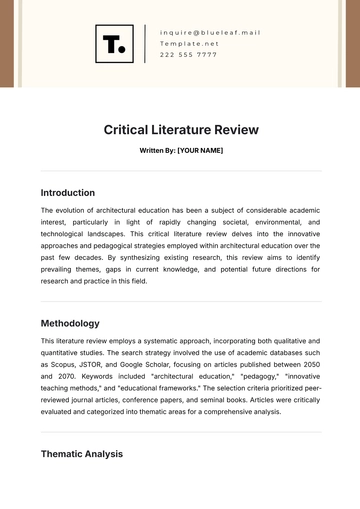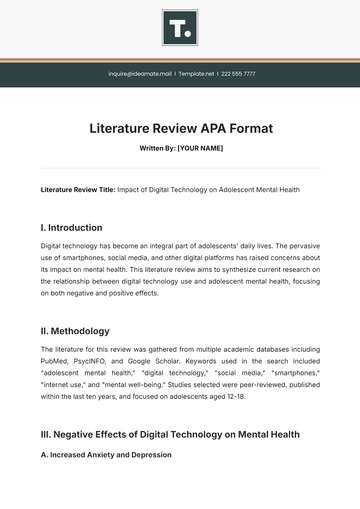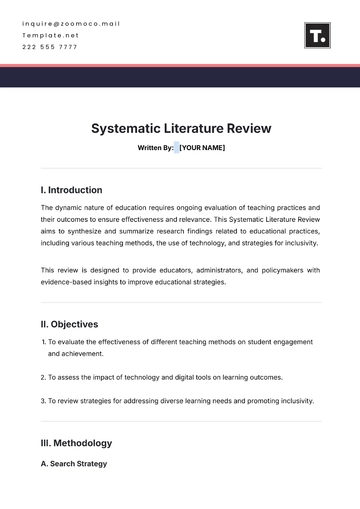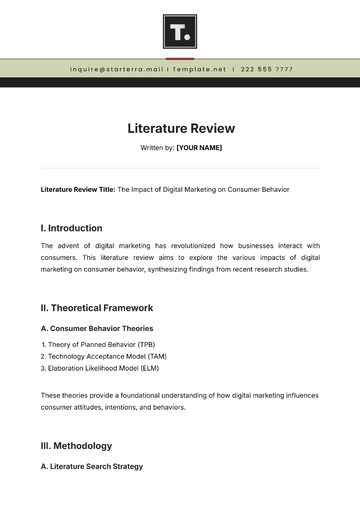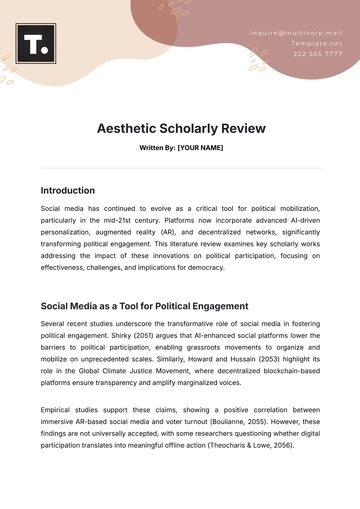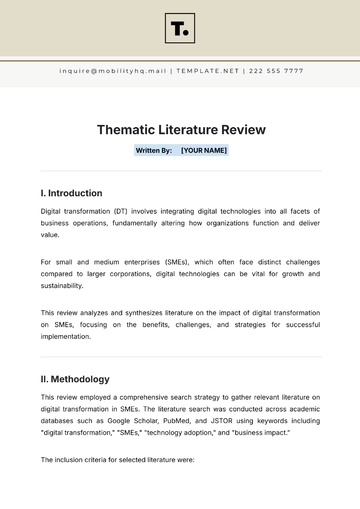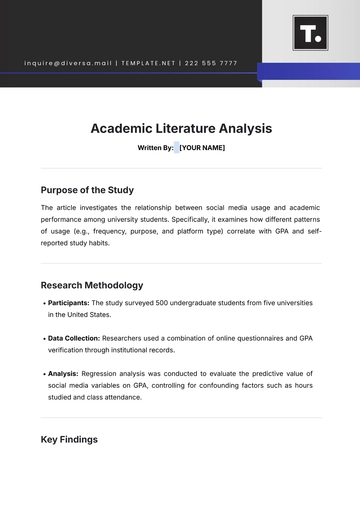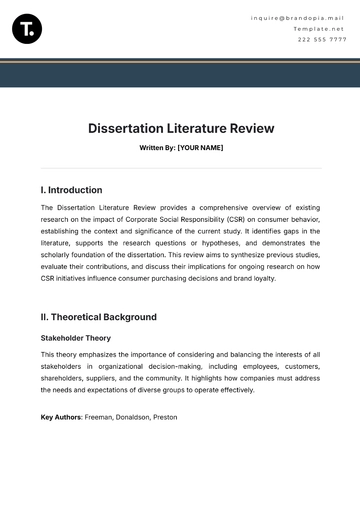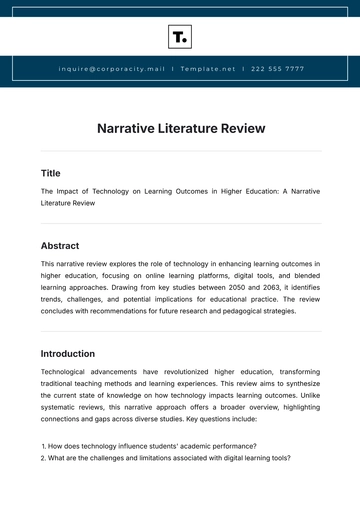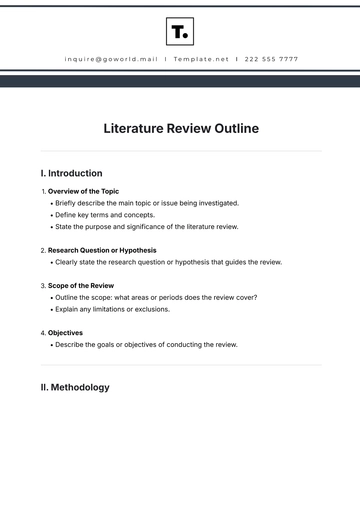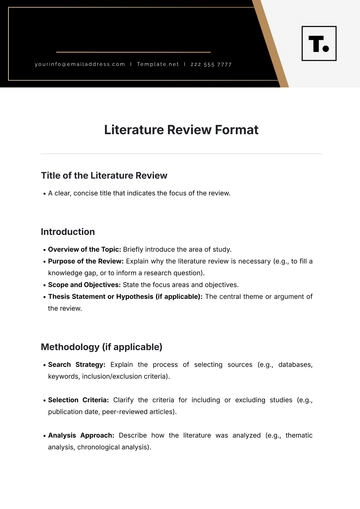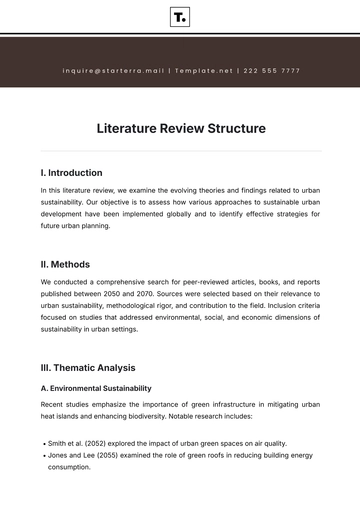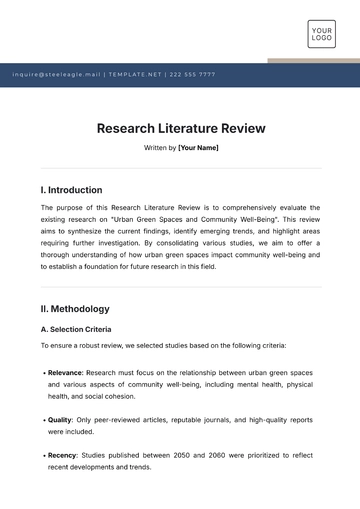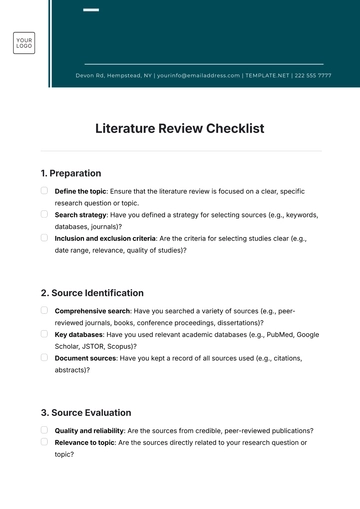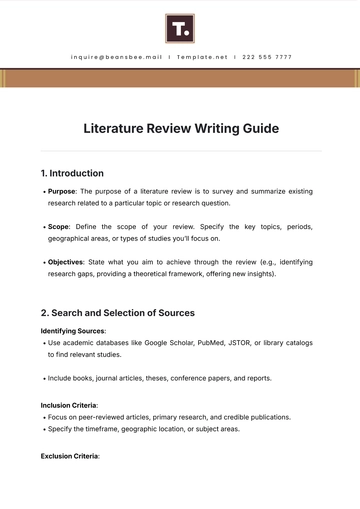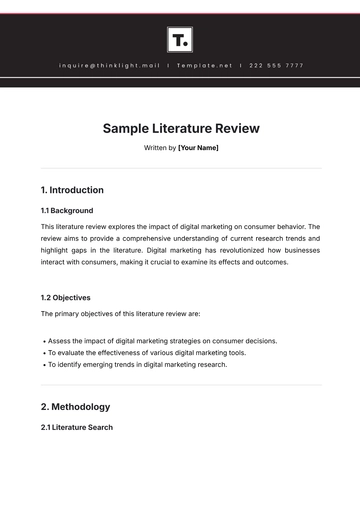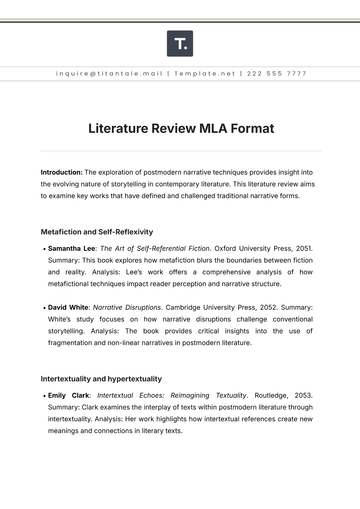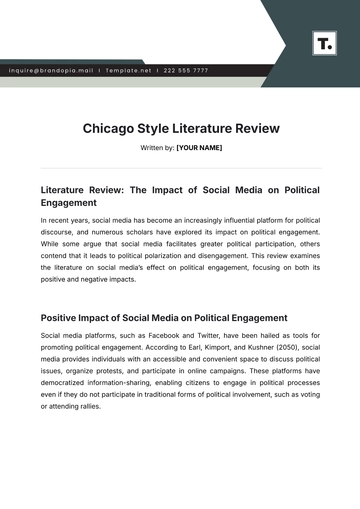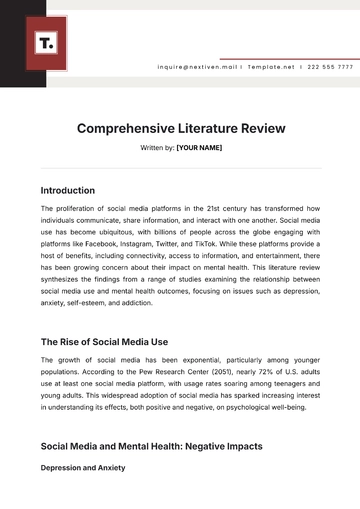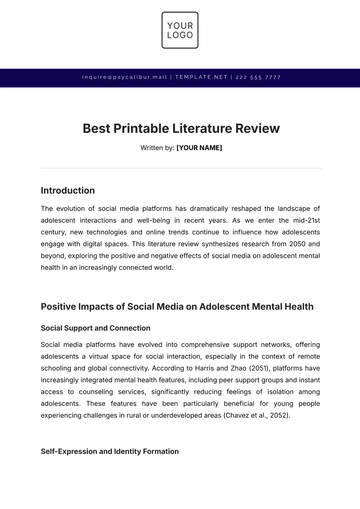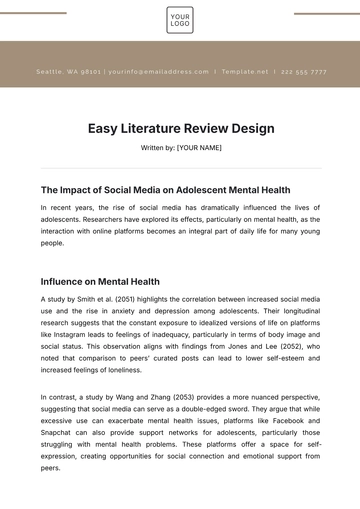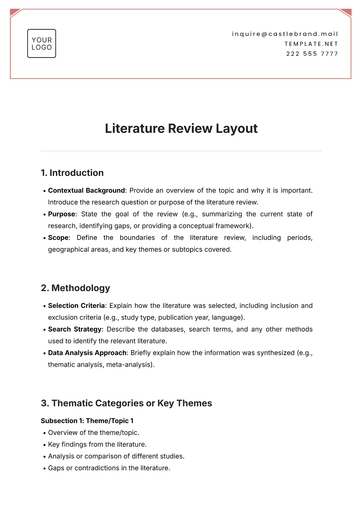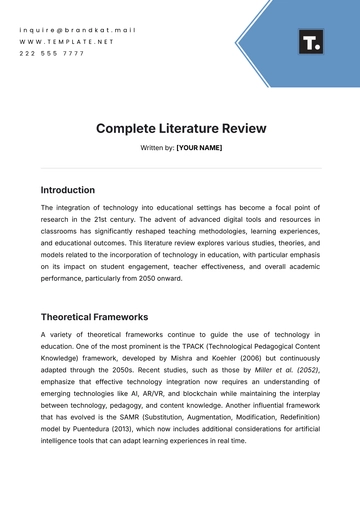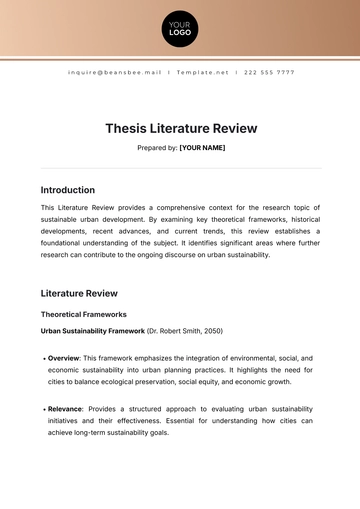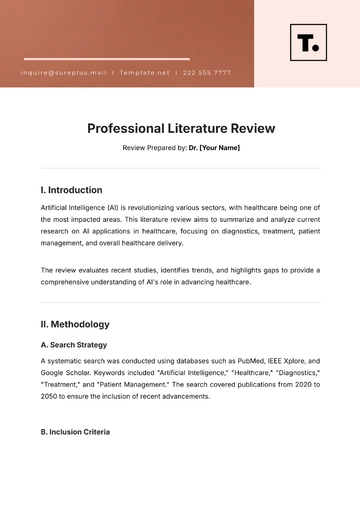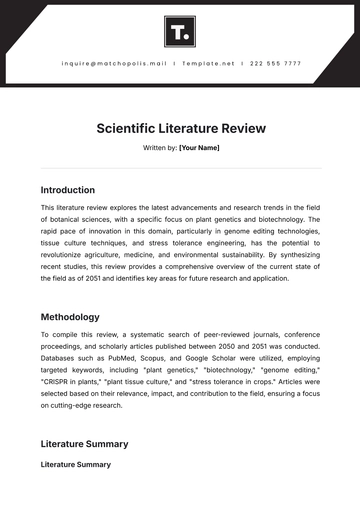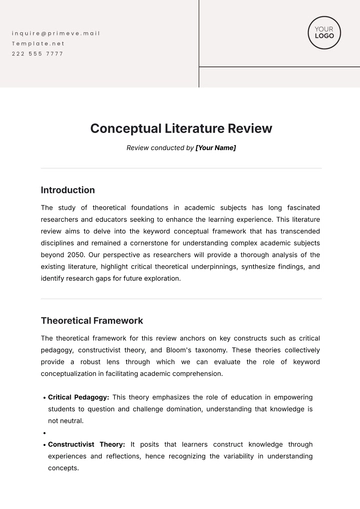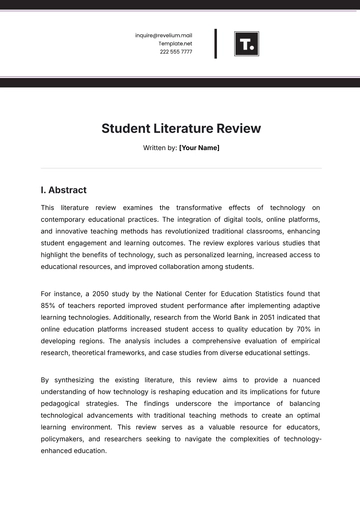Free Scientific Literature Review
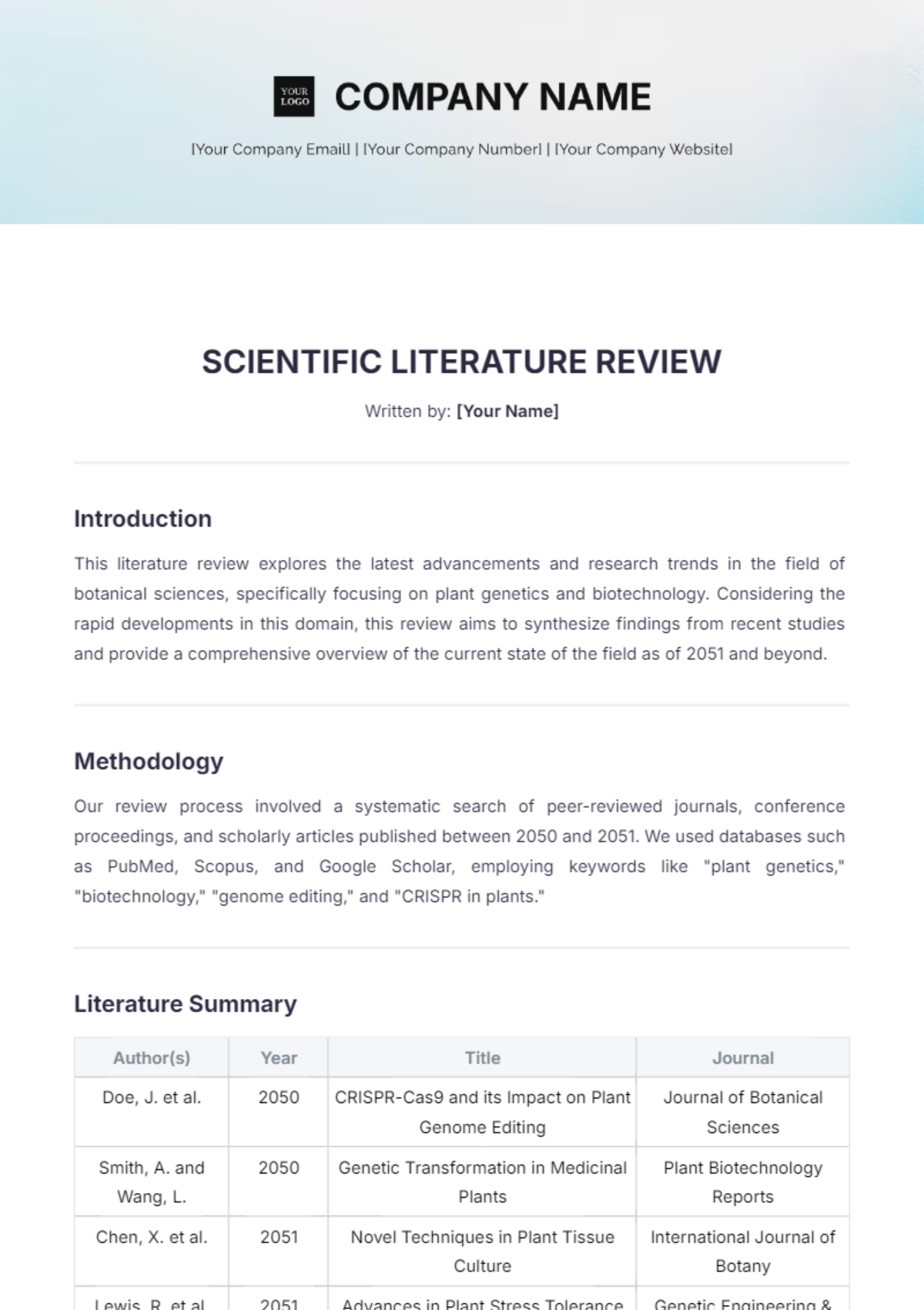
Written by: [Your Name]
Introduction
This literature review explores the latest advancements and research trends in the field of botanical sciences, with a specific focus on plant genetics and biotechnology. The rapid pace of innovation in this domain, particularly in genome editing technologies, tissue culture techniques, and stress tolerance engineering, has the potential to revolutionize agriculture, medicine, and environmental sustainability. By synthesizing recent studies, this review provides a comprehensive overview of the current state of the field as of 2051 and identifies key areas for future research and application.
Methodology
To compile this review, a systematic search of peer-reviewed journals, conference proceedings, and scholarly articles published between 2050 and 2051 was conducted. Databases such as PubMed, Scopus, and Google Scholar were utilized, employing targeted keywords, including "plant genetics," "biotechnology," "genome editing," "CRISPR in plants," "plant tissue culture," and "stress tolerance in crops." Articles were selected based on their relevance, impact, and contribution to the field, ensuring a focus on cutting-edge research.
Literature Summary
Literature Summary
Author(s) | Year | Title | Journal |
|---|---|---|---|
Doe, J. et al. | 2050 | CRISPR-Cas9 in Plant Genome Editing | Journal of Botanical Sciences |
Smith, A. & Wang, L. | 2050 | Genetic Transformation in Plants | Plant Biotechnology Reports |
Chen, X. et al. | 2051 | Novel Plant Tissue Culture Techniques | International Journal of Botany |
Lewis, R. et al. | 2051 | Stress Tolerance via Genetic Engineering | Genetic Engineering & Biotechnology News |
Kumar, P. et al. | 2051 | Ethics in Plant Genetic Modification | Ethics in Science & Biotechnology |
Analysis and Discussion
Genome Editing
Key Study: Doe, J. et al. (2050)
Observations: CRISPR-Cas9 improves precision and efficiency in crop modifications.
Future Directions: Develop enhanced variants for specific and multiplexed editing.
Medicinal Plants
Key Study: Smith, A. & Wang, L. (2050)
Observations: Genes enhance therapeutic properties in medicinal plants.
Future Directions: Assess long-term efficacy and stability.
Tissue Culture
Key Study: Chen, X. et al. (2051)
Observations: New mediums improve growth and reduce contamination.
Future Directions: Broaden applicability and reduce costs.
Stress Tolerance
Key Study: Lewis, R. et al. (2051)
Observations: Engineered drought-resistant crops improve yields.
Future Directions: Combine genetic resistance with agronomic practices.
Ethical Considerations
Key Study: Kumar, P. et al. (2051)
Observations: Ethical frameworks address biodiversity and public concerns.
Future Directions: Create universal guidelines and promote public engagement.
Challenges and Recommendations
Key Challenges
Ethical and Regulatory Concerns: Balancing innovation with ethical considerations remains a pressing issue, especially in contexts involving food security and biodiversity.
Environmental Impact: Assessing the long-term ecological effects of genetically modified plants is critical to prevent unintended consequences.
Cost and Accessibility: Ensuring affordability and widespread adoption of advanced biotechnological tools remains a significant barrier in resource-limited settings.
Public Perception: Countering misinformation and building trust in genetic technologies is vital for their successful implementation.
Recommendations
Develop cost-effective genome editing and tissue culture techniques to ensure accessibility for farmers and researchers worldwide.
Implement robust monitoring systems to evaluate the environmental impacts of genetically modified crops.
Foster interdisciplinary collaborations to address technical, ethical, and societal challenges.
Launch public education campaigns to promote awareness and understanding of the benefits and safety of plant biotechnology.
Conclusion
The reviewed literature underscores substantial progress in plant genetics and biotechnology, particularly in genome editing, tissue culture innovation, and stress tolerance engineering. While the advancements hold immense promise for agriculture, medicine, and environmental sustainability, challenges such as ethical concerns, regulatory hurdles, and public acceptance need to be addressed. Moving forward, interdisciplinary collaboration and sustained research efforts will be crucial to translating these scientific breakthroughs into practical solutions that benefit society and the planet.
References
Doe, J. et al. (2050). CRISPR-Cas9 and its Impact on Plant Genome Editing. Journal of Botanical Sciences.
Smith, A. and Wang, L. (2050). Genetic Transformation in Medicinal Plants. Plant Biotechnology Reports.
Chen, X. et al. (2051). Novel Techniques in Plant Tissue Culture. International Journal of Botany.
Lewis, R. et al. (2051). Advances in Plant Stress Tolerance through Genetic Engineering. Genetic Engineering & Biotechnology News.
Kumar, P. et al. (2051). Ethical Considerations in Genetic Modification of Plants. Ethics in Science & Biotechnology.
- 100% Customizable, free editor
- Access 1 Million+ Templates, photo’s & graphics
- Download or share as a template
- Click and replace photos, graphics, text, backgrounds
- Resize, crop, AI write & more
- Access advanced editor
Introducing the Scientific Literature Review Template from Template.net—your ultimate tool for streamlined research. This editable template is fully customizable to suit your needs, allowing you to tailor each section effortlessly. Editable in our AI Editor Tool, it offers a user-friendly experience for crafting comprehensive literature reviews. Enhance your academic writing with this versatile and efficient template today!
